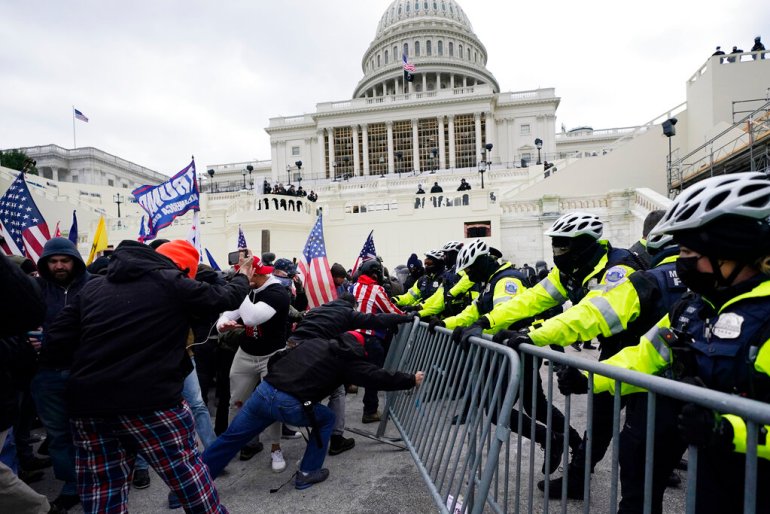Former Trump aide Meadows cooperating with Capitol riot panel
Donald Trump’s ex-Chief of Staff Mark Meadows had been called to appear before the House committee this month but did not do so.

Former US President Donald Trump’s ex-chief of staff is cooperating with a congressional panel investigating the deadly January 6 Capitol insurrection, including providing documentation, the committee’s chairman has said.
The agreement announced on Tuesday comes after two months of negotiations between Mark Meadows and the US House of Representatives committee, which is probing the events that led up to the deadly riot by a mob of Trump supporters at the US Capitol building.
Keep reading
list of 3 itemsTrump files lawsuit to block release of Capitol riot records
US Capitol riot panel subpoenas more former Trump allies
It also comes after the US Department of Justice indicted longtime Trump ally Steve Bannon for defying a subpoena to cooperate in the investigation.
Democratic Representative Bennie Thompson, chairman of the House of Representatives select committee investigating the deadly events, said in a statement on Tuesday that he expects Meadows “to provide all information requested”.
“Mr. Meadows has been engaging with the Select Committee through his attorney. He has produced records to the committee and will soon appear for an initial deposition,” Thompson said.

On January 6, Trump supporters stormed the US Capitol in a bid to prevent Congress from formally certifying his 2020 presidential election loss to Democrat Joe Biden. Five people died and more than 100 law enforcement officers were injured.
Shortly before the riot, Trump gave a speech to his supporters repeating his false claims that the election was “stolen” from him through widespread voter fraud. He urged to crowd to “fight like hell” to “stop the steal” and was later impeached for “incitement of insurrection”.
Trump has sought to block the release of White House documents related to the January 6 insurrection by invoking “executive privilege”. The Biden administration rejected that argument in October, but Trump has gone to the courts to seek an order barring the release.
The former Republican president has urged his former associates not to cooperate with the committee, calling the Democratic-led investigation politically motivated and arguing that his communications are protected.
Several have refused to cooperate with the panel, which has scheduled a vote for Wednesday to pursue contempt charges against a separate witness, former Department of Justice official Jeffrey Clark, after he appeared for a deposition but declined to answer questions.
On Tuesday, a panel of US appeals court judges showed scepticism towards Trump’s bid to withhold records about his conversations and actions before and during the deadly riot.
Judge Ketanji Brown Jackson questioned why Trump should be able to challenge and overrule Biden’s determination that the records should be handed over. “Is there a circumstance where the former president ever gets to make this sort of call?” asked Jackson.
Trump’s lawyer argued that a 1978 law called the Presidential Records Act gives Trump that power. “I don’t see that in the statute,” Jackson responded.

Meanwhile, the House panel says that it has questions for Meadows, the ex-Trump chief of staff, that do not directly involve conversations with the former president and could not be blocked by executive privilege claims.
In the committee’s subpoena, Thompson cited Meadows’ efforts to overturn Trump’s 2020 election defeat and his pressure on state officials to push the ex-president’s false claims of widespread voter fraud.
Meadows’s lawyer, George Terwilliger, said he was continuing to work with the committee and its staff on a “potential accommodation” that would not require Meadows to waive executive privilege nor “forfeit the long-standing position that senior White House aides cannot be compelled to testify before Congress”, as Trump has argued.
“We appreciate the Select Committee’s openness to receiving voluntary responses on non-privileged topics,” Terwilliger said in a statement.
Terwilliger had previously said that Meadows would not comply with the panel’s September subpoena because of Trump’s executive privilege claims.